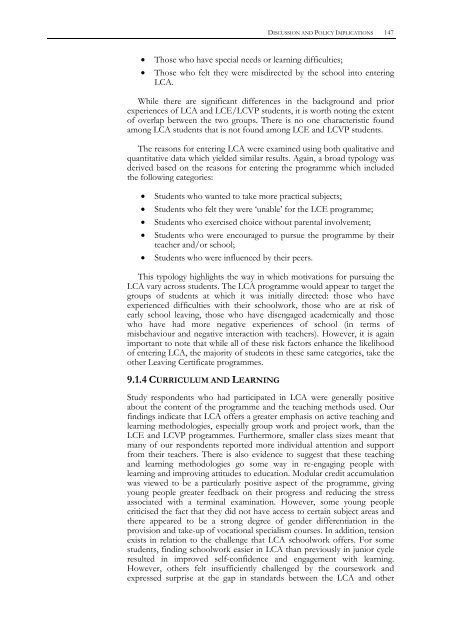Student Experiences of the Leaving Certificate Applied Programme
Student Experiences of the Leaving Certificate Applied Programme
Student Experiences of the Leaving Certificate Applied Programme
You also want an ePaper? Increase the reach of your titles
YUMPU automatically turns print PDFs into web optimized ePapers that Google loves.
DISCUSSION AND POLICY IMPLICATIONS 147• Those who have special needs or learning difficulties;• Those who felt <strong>the</strong>y were misdirected by <strong>the</strong> school into enteringLCA.While <strong>the</strong>re are significant differences in <strong>the</strong> background and priorexperiences <strong>of</strong> LCA and LCE/LCVP students, it is worth noting <strong>the</strong> extent<strong>of</strong> overlap between <strong>the</strong> two groups. There is no one characteristic foundamong LCA students that is not found among LCE and LCVP students.The reasons for entering LCA were examined using both qualitative andquantitative data which yielded similar results. Again, a broad typology wasderived based on <strong>the</strong> reasons for entering <strong>the</strong> programme which included<strong>the</strong> following categories:• <strong>Student</strong>s who wanted to take more practical subjects;• <strong>Student</strong>s who felt <strong>the</strong>y were ‘unable’ for <strong>the</strong> LCE programme;• <strong>Student</strong>s who exercised choice without parental involvement;• <strong>Student</strong>s who were encouraged to pursue <strong>the</strong> programme by <strong>the</strong>irteacher and/or school;• <strong>Student</strong>s who were influenced by <strong>the</strong>ir peers.This typology highlights <strong>the</strong> way in which motivations for pursuing <strong>the</strong>LCA vary across students. The LCA programme would appear to target <strong>the</strong>groups <strong>of</strong> students at which it was initially directed: those who haveexperienced difficulties with <strong>the</strong>ir schoolwork, those who are at risk <strong>of</strong>early school leaving, those who have disengaged academically and thosewho have had more negative experiences <strong>of</strong> school (in terms <strong>of</strong>misbehaviour and negative interaction with teachers). However, it is againimportant to note that while all <strong>of</strong> <strong>the</strong>se risk factors enhance <strong>the</strong> likelihood<strong>of</strong> entering LCA, <strong>the</strong> majority <strong>of</strong> students in <strong>the</strong>se same categories, take <strong>the</strong>o<strong>the</strong>r <strong>Leaving</strong> <strong>Certificate</strong> programmes.9.1.4 CURRICULUM AND LEARNINGStudy respondents who had participated in LCA were generally positiveabout <strong>the</strong> content <strong>of</strong> <strong>the</strong> programme and <strong>the</strong> teaching methods used. Ourfindings indicate that LCA <strong>of</strong>fers a greater emphasis on active teaching andlearning methodologies, especially group work and project work, than <strong>the</strong>LCE and LCVP programmes. Fur<strong>the</strong>rmore, smaller class sizes meant thatmany <strong>of</strong> our respondents reported more individual attention and supportfrom <strong>the</strong>ir teachers. There is also evidence to suggest that <strong>the</strong>se teachingand learning methodologies go some way in re-engaging people withlearning and improving attitudes to education. Modular credit accumulationwas viewed to be a particularly positive aspect <strong>of</strong> <strong>the</strong> programme, givingyoung people greater feedback on <strong>the</strong>ir progress and reducing <strong>the</strong> stressassociated with a terminal examination. However, some young peoplecriticised <strong>the</strong> fact that <strong>the</strong>y did not have access to certain subject areas and<strong>the</strong>re appeared to be a strong degree <strong>of</strong> gender differentiation in <strong>the</strong>provision and take-up <strong>of</strong> vocational specialism courses. In addition, tensionexists in relation to <strong>the</strong> challenge that LCA schoolwork <strong>of</strong>fers. For somestudents, finding schoolwork easier in LCA than previously in junior cycleresulted in improved self-confidence and engagement with learning.However, o<strong>the</strong>rs felt insufficiently challenged by <strong>the</strong> coursework andexpressed surprise at <strong>the</strong> gap in standards between <strong>the</strong> LCA and o<strong>the</strong>r

















